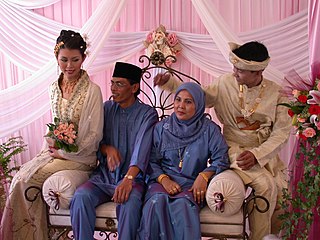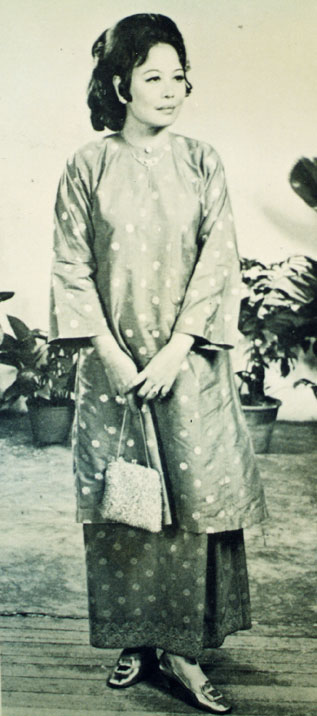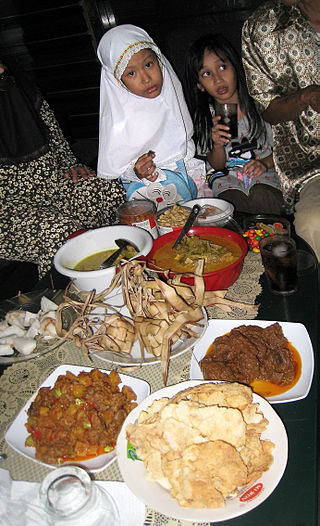
Malay is an Austronesian language that is an official language of Brunei, Indonesia, Malaysia, and Singapore, and that is also spoken in East Timor and parts of Thailand. Altogether, it is spoken by 290 million people across Maritime Southeast Asia.

Riau is a province of Indonesia. It is located on the central eastern coast of Sumatra along the Strait of Malacca. The province shares land borders with North Sumatra to the northwest, West Sumatra to the west, and Jambi to the south, and a maritime border with the Riau Islands and the country of Malaysia to the east. It is the second-largest province in the island of Sumatra after South Sumatra, and is slightly larger than Jordan. According to the 2020 census, Riau had a population of 6,394,087 across a land area of 89,935.90 km²; the official estimate of population as of mid-2022 was 6,614,384. The province comprises ten regencies and two cities, with Pekanbaru serving as the capital and largest city.

Malays are an Austronesian ethnoreligious group native to eastern Sumatra, the Malay Peninsula and coastal Borneo, as well as the smaller islands that lie between these locations. These locations are today part of the countries of Malaysia, Indonesia, the southern part of Thailand, Singapore and Brunei Darussalam.

The Riau Islands is a province of Indonesia—not to be confused with neighbouring Riau Province from which the islands were separated in 2002. The capital of the province is Tanjung Pinang and the largest city is Batam. It shares a maritime border with Riau and Jambi to the east, Bangka Belitung Islands to the south, Singapore to the northeast, Malaysia and West Kalimantan to the west, and Vietnam and Cambodia to the north. It comprises a total of 1,796 islands scattered between Sumatra, Malay Peninsula, and Borneo including the Riau Archipelago. Situated on one of the world's busiest shipping lanes along the Malacca Strait and the Natuna Sea, the province shares water borders with neighboring countries such as Singapore, Malaysia, and Brunei. The Riau Islands also have relatively large potential mineral resources and energy, as well as marine resources.

Jawi is a writing system used for writing several languages of Southeast Asia, such as Acehnese, Malay, Mëranaw, Minangkabau, Tausūg, and Ternate. Jawi is based on the Arabic script, consisting of all of the original 31 Arabic letters, and six additional letters constructed to fit the phonemes native to Malay, and an additional phoneme used in foreign loanwords, but not found in Classical Arabic, which are ca, nga, pa, ga, va, and nya.

Malaysian Malay, also known as Standard Malay, Bahasa Malaysia, or simply Malay, is a standardized form of the Malay language used in Malaysia and also used in Brunei and Singapore. Malaysian Malay is standardized from the Johore-Riau dialect of Malay. It is spoken by much of the Malaysian population, although most learn a vernacular form of Malay or another native language first. Malay is a compulsory subject in primary and secondary schools.

Malay Singaporeans are Singaporeans with general ancestry from the Malay world. They constitute approximately 13.5% of the country's citizens, making them the second largest ethnic group in Singapore. Under the Constitution of Singapore, they are recognised by the government as the indigenous people of the country, with Malay as the de jure national language of Singapore.

Suhur, Sahur, or Suhoor, also called Sahari, Sahri, or Sehri is the meal consumed early in the morning by Muslims before fasting (sawm), before dawn during or outside the Islamic month of Ramadan. The meal is eaten before fajr prayer. Suhur corresponds to iftar, the evening meal during Ramadan, replacing the traditional three meals a day, although in some places dinner is also consumed after iftar later during the night.

Zapin is one of the most popular dance and musical forms in traditional Malay performing arts. Dance movements are choreographed to melodies, which are performed using musical instruments such as the gambus, accordion, and rebana. It is believed to have been introduced by Persian and Arab Muslim missionaries from the Middle East to the Malay Archipelago around the fourteenth century, where back then only males were allowed to perform; nowadays, female dancers are included. It used to be performed exclusively for religious ceremonies but through the years it has become a form of traditional entertainment, hence the participation of female dancers is allowed.

Malay houses refer to the vernacular dwellings of the Malays, an ethno-linguistic group inhabiting Sumatra, coastal Borneo and the Malay Peninsula.

The bedug is one of the drums used in the gamelan. It is also used among Muslims in Indonesia and Malaysia to signal mosque prayer times. The hitting of the instrument is particularly done according to a rhythm that goes in an increasingly rapid pace.
Betawi, also known as Betawi Malay, Jakartan Malay, or Batavian Malay, is the spoken language of the Betawi people in Jakarta, Indonesia. It is the native language of perhaps 5 million people; a precise number is difficult to determine due to the vague use of the name.
Rempang Island is an Indonesian island, located 2.5 km southeast of the neighbouring Batam Island, with the total land mass size of 165.83 km2. Rempang Island belongs to the three-interconnected islands group of Riau Archipelago known as Barelang, and administratively part of the Riau Islands Province. The nearest urban city to Rempang Island is the Tanjung Pinang City, located on neighbouring Bintan Island.

Malay Indonesians are ethnic Malays living throughout Indonesia. They are one of the indigenous peoples of the country. Indonesian, the national language of Indonesia, is a standardized form of Riau Malay. There were numerous kingdoms associated with the Indonesian Malays along with other ethnicities in what is now Indonesia, mainly on the islands of Borneo and Sumatra. These included Srivijaya, the Melayu Kingdom, Dharmasraya, the Sultanate of Deli, the Sultanate of Siak Sri Indrapura, the Riau-Lingga Sultanate, the Sultanate of Bulungan, Pontianak Sultanate, and the Sultanate of Sambas. The 2010 census states that there are 8 million Malays in Indonesia; this number comes from the classification of Malays in East Sumatra and the coast of Kalimantan which is recognized by the Indonesian government. This classification is different from the Malaysia and Singapore census which includes all ethnic Muslims from the Indonesian archipelago as Malays.

Baju Kurung is a traditional attire of Malays and traditionally worn by women in Brunei, Indonesia, Malaysia, Singapore and southern Thailand. This type of traditional attire is the national dress of Brunei and Malaysia. In Indonesia, this dress is also worn as a regional attire, commonly observed on the island of Sumatra, particularly by the ethnic Malay and Minangkabau women.

Lebaran is the Indonesian popular name for two Islamic official holidays, Eid al-Fitr and Eid al-Adha in Indonesia, and is one of the major national holidays in the country. Lebaran holiday officially lasts for two days in the Indonesian calendar, although the government usually declares a few days before and after the Lebaran as a bank holiday. Many individuals or families, especially Muslims take paid time off from their workplace during these days.

Riau-Lingga Sultanate, also known as the Lingga-Riau Sultanate, Riau Sultanate or Lingga Sultanate was a Malay sultanate that existed from 1824 to 1911, before being dissolved following Dutch intervention.

Asam pedas is a Maritime Southeast Asian sour and spicy fish stew dish. Asam pedas is believed to come from Minangkabau cuisine of West Sumatra, Indonesia and has spread throughout to the islands of Sumatra, Borneo and the Malay Peninsula.
Loloan Malays or Balinese Malays are a sub-ethnic group of the Malay who have lived in Loloan, Jembrana, Bali, Indonesia since the 17th century. There are approximately 28,000 up to 65,000 Loloan Malays living in Bali.















